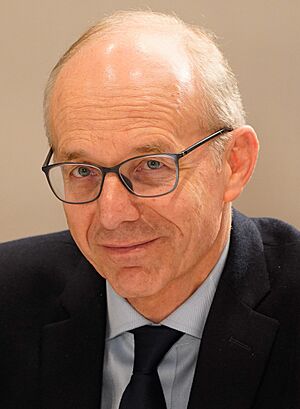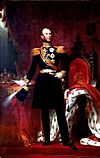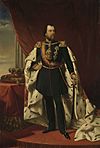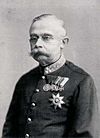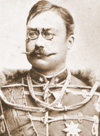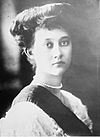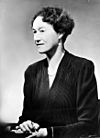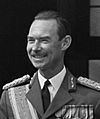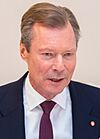List of prime ministers of Luxembourg facts for kids
Quick facts for kids Prime Minister of Grand Duchy of Luxembourg |
|
|---|---|
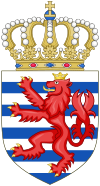
Lesser coat of arms of Luxembourg
|
|
| Executive branch of the Grand Duchy of Luxembourg | |
| Style | Mr. Prime Minister (informal) The Honorable (formal) His Excellency (diplomatic) |
| Member of |
|
| Reports to | Monarch • Parliament |
| Residence | Hôtel Saint-Maximin |
| Seat | Luxembourg City |
| Appointer | Grand Duke of Luxembourg |
| Term length | No fixed term |
| Constituting instrument | Constitution of the Grand Duchy of Luxembourg |
| Formation | 1 August 1848 |
| First holder | Gaspard-Théodore-Ignace de la Fontaine |
| Deputy | Deputy Prime Minister |
| Salary | €256,800 annually |
| Website | gouvernement.lu |
The Prime Minister of Luxembourg is the main leader of the government in Luxembourg. This person is in charge of the country's daily operations. They lead the group of ministers, called the Cabinet, and choose who those ministers will be.
Since 1989, "Prime Minister" has been the official title. Before that, the leader was often called the "President of the Government." Even earlier, before 1857, the title was "President of the Council." The Prime Minister also uses the title "Minister of State."
This article lists the Prime Ministers and their governments since the role began in 1848. The larger dates show when a Prime Minister started and left office. Smaller dates show changes within a Prime Minister's government. Luxembourg has a system where the government works together. Sometimes, a government might resign, but many of the same ministers stay with the same Prime Minister.
Contents
Early Leaders of Luxembourg (1848–1918)
From 1848, when Luxembourg got its first constitution, until the early 1900s, the country's politics were mostly led by independent politicians. The Grand Duke had a lot of power. He personally chose and appointed the Prime Minister. Because of this, Prime Ministers were often moderate. They did not strongly belong to either of the two main groups in the parliament: the liberals or the Catholics.
In the early 1900s, a new political force, socialism, became important. This changed Luxembourg's government. This shift became very clear in 1915 when Paul Eyschen, a long-serving Prime Minister, died in office. His death led to a power struggle. This struggle helped create the formal party system we see today.
Prime Ministers from 1848 to 1890
| Prime Minister (born–died) |
Portrait | Time in Office | Monarchs (Reign) |
||||
|---|---|---|---|---|---|---|---|
| No. | Start | End | |||||
| 1 | Gaspard-Théodore-Ignace de la Fontaine (1787–1871) |
1 August 1848 | 6 December 1848 | Willem II
(1840–1849) |
|||
| First Prime Minister. Resigned after a vote of no confidence. | |||||||
| 2 | Jean-Jacques Madeleine Willmar (1792–1866) |
6 December 1848 | 23 September 1853 | Willem III
(1849–1890) |
|||
| Removed from office by the Governor. | |||||||
| 3 | Charles-Mathias Simons (1802–1874) |
1 2 3 4 5 6 7 8 |
23 September 1853 23 September 1854 24 May 1856 2 June 1857 29 November 1857 12 November 1858 23 June 1859 15 July 1859 |
23 September 1854 24 May 1856 2 June 1857 29 November 1857 12 November 1858 23 June 1859 15 July 1859 26 September 1860 |
|||
| Was "President of the Council" until November 1857, then "President of the Government." Resigned. | |||||||
| 4 | Victor, Baron de Tornaco (1805–1875) |
1 2 3 4 5 6 7 |
26 September 1860 9 September 1863 31 March 1864 26 January 1866 3 December 1866 14 December 1866 18 June 1867 |
9 September 1863 31 March 1864 26 January 1866 3 December 1866 14 December 1866 18 June 1867 3 December 1867 |
|||
| Resigned after a vote of no confidence. | |||||||
| 5 | Lambert Joseph Emmanuel Servais (1811–1890) |
1 2 3 4 5 |
3 December 1867 30 September 1869 12 October 1869 7 February 1870 25 May 1873 |
30 September 1869 12 October 1869 7 February 1870 25 May 1873 26 December 1874 |
|||
| Resigned. | |||||||
| 6 | Félix, Baron de Blochausen (1834–1915) |
1 2 3 4 5 6 |
26 December 1874 26 April 1875 8 July 1876 6 August 1878 21 September 1882 12 October 1882 |
26 April 1875 8 July 1876 6 August 1878 21 September 1882 12 October 1882 20 February 1885 |
|||
| Removed from office by the Grand Duke. | |||||||
| 7 | Jules Georges Édouard Thilges (1817–1904) |
20 February 1885 | 22 September 1888 | ||||
| Resigned. | |||||||
The Kingdom of the Netherlands and the Grand Duchy of Luxembourg shared the same monarchs until 1890. Since 1890, Luxembourg has had its own monarchs.
Prime Ministers from 1890 to 1918
| Prime Minister (born–died) |
Portrait | Time in Office | Monarchs (Reign) |
||||
|---|---|---|---|---|---|---|---|
| No. | Start | End | |||||
| 8 | Paul Eyschen (1841–1915) |
1 2 3 4 5 6 |
22 September 1888 26 October 1892 23 June 1896 25 October 1905 9 January 1910 3 March 1915 |
26 October 1892 23 June 1896 25 October 1905 9 January 1910 3 March 1915 11 October 1915 |
Adolphe
(1890–1905) Guillaume IV (1905–1912) |
||
| Longest time as Prime Minister. Luxembourg was occupied by Germany during World War I. Died in office. | |||||||
| 9 | Mathias Mongenast (1843–1926) |
12 October 1915 | 6 November 1915 | Marie-Adélaïde
(1912–1919) |
|||
| Shortest time as Prime Minister. Resigned. | |||||||
| 10 | Hubert Loutsch (1878–1946) |
6 November 1915 | 24 February 1916 | ||||
| Resigned after a vote of no confidence. | |||||||
| 11 | Victor Thorn (1844–1930) |
24 February 1916 | 19 June 1917 | ||||
| Resigned. | |||||||
| 12 | Léon Kauffman (1869–1952) |
19 June 1917 | 28 September 1918 | ||||
| Resigned. | |||||||
Timeline generation failed: 1 error found
- Plot height less than 20 pixels = 0.2 inch. Please adjust.
Modern Political Parties (1918–Present)
In 1918, near the end of World War I, a new parliament was chosen. Its main goal was to change the constitution. To do this, the main political groups formed official parties. This helped them have more power in discussions. The changes to the constitution gave everyone the right to vote. It also introduced a fair way of counting votes and limited the power of the monarch.
Since political parties became formal, almost all governments have included members from more than one party. Most of the time, governments are "grand coalitions." This means the two largest parties work together, no matter their political ideas. This has made Luxembourg one of the most stable democracies in the world. Some governments have even included members from every party in parliament.
During World War II, Nazi Germany occupied Luxembourg. A Nazi official, Gustav Simon, governed Luxembourg. However, Pierre Dupong continued to lead the government in exile from the United Kingdom. When Luxembourg was freed in December 1944, the official government returned. So, even though Luxembourg was formally taken over in 1942, Pierre Dupong is considered to have remained Prime Minister throughout that time.
Prime Ministers Since 1918
Political Party: PD PNI CSV DP
| # | Prime Minister (born–died) |
Portrait | Political party | Time in Office | Government | Coalition | Monarchs (Reign) |
|||
|---|---|---|---|---|---|---|---|---|---|---|
| Election | Start | End | ||||||||
| 13 | Émile Reuter (1874–1973) |
PD | — 1919 1922 |
28 September 1918 5 January 1920 15 April 1921 |
5 January 1920 15 April 1921 20 March 1925 |
Reuter | PD, LL PD, LL PD |
Marie-Adélaïde 1912-1919 | ||
| Charlotte
(1919–1964) |
||||||||||
| First government with political parties. Resigned. | ||||||||||
| 14 | Pierre Prüm (1886–1950) |
PNI | 1925 | 20 March 1925 | 16 July 1926 | Prüm | PNI, PRS | |||
| Only PNI Prime Minister. Resigned. | ||||||||||
| 15 | Joseph Bech (1887–1975) (1st time) |
PD | 1928, 1931 1934 1937 |
16 July 1926 11 April 1932 27 December 1936 |
11 April 1932 27 December 1936 5 November 1937 |
Bech | PD, LdG PD, PRL PD, PRL |
|||
| Resigned. | ||||||||||
| 16 | Pierre Dupong (1885–1953) |
PD | — — — |
5 November 1937 7 February 1938 6 April 1940 |
7 February 1938 6 April 1940 10 May 1940 |
Dupong-Krier | PD, POL, PRL PD, POL PD, POL |
|||
| — | 10 May 1940 | 23 November 1944 | Govt. in Exile | PD, POL | ||||||
| CSV | — — — |
23 November 1944 23 February 1945 21 April 1945 |
23 February 1945 21 April 1945 14 November 1945 |
Liberation | CSV, LSAP | |||||
| 1945 — |
14 November 1945 29 August 1946 |
29 August 1946 1 March 1947 |
National Union | CSV, LSAP, GD, KPL | ||||||
| — 1948 |
1 March 1947 14 July 1948 |
14 July 1948 3 July 1951 |
Dupong-Schaus | CSV, GD | ||||||
| 1951 | 3 July 1951 | 23 December 1953 | Dupong-Bodson | CSV, LSAP | ||||||
| Led the government during World War II, including the government in exile. Died in office. | ||||||||||
| 17 | Joseph Bech (1887–1975) (2nd time) |
CSV | — 1954 |
29 December 1953 29 June 1954 |
29 June 1954 29 March 1958 |
Bech-Bodson | CSV, LSAP | |||
| Resigned. | ||||||||||
| 18 | Pierre Frieden (1892–1959) |
CSV | 1959 | 29 March 1958 | 23 February 1959 | Frieden | CSV, LSAP | |||
| Won the 1959 election; died in office. | ||||||||||
| 19 | Pierre Werner (1913–2002) (1st time) |
CSV | — | 2 March 1959 | 15 July 1964 | Werner-Schaus I | CSV, DP | |||
| 1964 — |
15 July 1964 3 January 1967 |
3 January 1967 6 February 1969 |
Werner-Cravatte | CSV, LSAP | Jean
(1964–2000) |
|||||
| 1968 — — |
6 February 1969 5 July 1971 19 September 1972 |
5 July 1971 19 September 1972 15 June 1974 |
Werner-Schaus II | CSV, DP | ||||||
| Longest time as Prime Minister in the party era. His party went into opposition after the 1974 election. | ||||||||||
| 20 | Gaston Egmond Thorn (1928–2007) |
DP | 1974 — — |
15 June 1974 21 July 1976 16 September 1977 |
21 July 1976 16 September 1977 16 July 1979 |
Thorn | DP, LSAP | |||
| First Prime Minister from the DP party. Became Deputy Prime Minister under Werner after the 1979 election. | ||||||||||
| 21 | Pierre Werner (1913–2002) (2nd time) |
CSV | 1979 — |
16 July 1979 3 March 1980 |
3 March 1980 22 November 1980 |
Werner-Thorn | CSV, DP | |||
| — — |
22 November 1980 21 December 1982 |
21 December 1982 20 July 1984 |
Werner-Flesch | |||||||
| Retired from politics after the 1984 election. | ||||||||||
| 22 | Jacques Santer (born 1937) |
CSV | 1984 | 20 July 1984 | 14 July 1989 | Santer-Poos I | CSV, LSAP | |||
| 1989 — |
14 July 1989 9 December 1992 |
9 December 1992 13 July 1994 |
Santer-Poos II | |||||||
| 1994 | 13 July 1994 | 26 January 1995 | Santer-Poos III | |||||||
| Was "President of the Government" until 1989, then "Prime Minister." Became President of the European Commission. | ||||||||||
| 23 | Jean-Claude Juncker (born 1954) |
CSV | — — |
26 January 1995 4 February 1998 |
4 February 1998 7 August 1999 |
Juncker-Poos | CSV, LSAP | |||
| 1999 | 7 August 1999 | 31 July 2004 | Juncker-Polfer | CSV, DP | Henri
(2000–present) |
|||||
| 2004 | 31 July 2004 | 23 July 2009 | Juncker-Asselborn I | CSV, LSAP | ||||||
| 2009 | 23 July 2009 | 4 December 2013 | Juncker-Asselborn II | |||||||
| Longest continuous time as Prime Minister in the party era. Also led the Eurogroup. Became President of the European Commission. | ||||||||||
| 24 | Xavier Bettel (born 1973) |
DP | 2013 | 4 December 2013 | 5 December 2018 | Bettel I | DP, LSAP, DG | |||
| 2018 | 5 December 2018 | 17 November 2023 | Bettel II | |||||||
| 25 | Luc Frieden (born 1963) |
CSV | 2023 | 17 November 2023 | Currently in office | Frieden-Bettel | CSV, DP | |||
Timeline of Prime Ministers
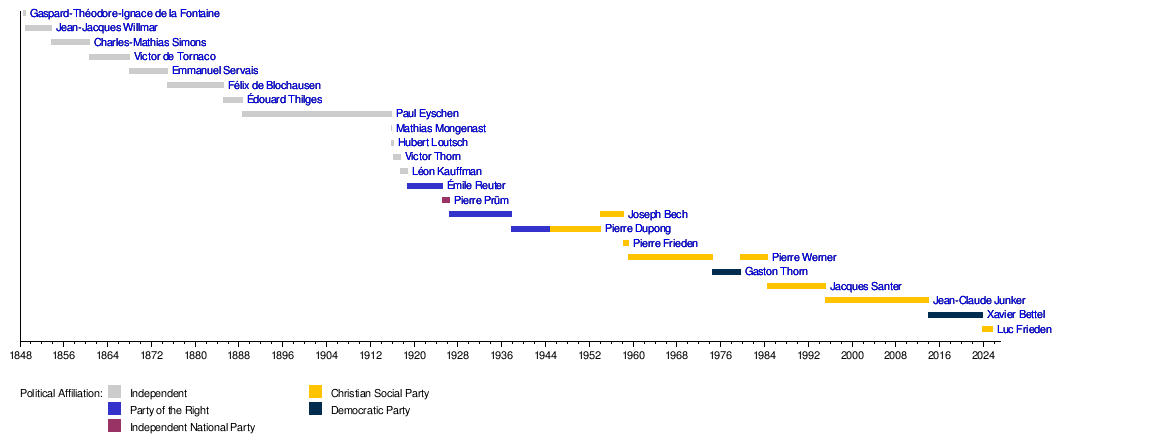
See also
- List of monarchs of Luxembourg
- Lists of office-holders
- List of presidents of the Council of State of Luxembourg


